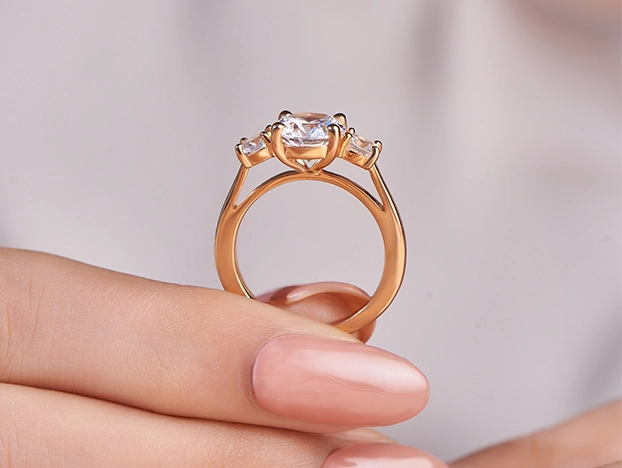The 4-Minute Rule for Engagement Rings
The 4-Minute Rule for Engagement Rings
Blog Article
What Does Engagement Rings Do?
Table of ContentsHow Engagement Rings can Save You Time, Stress, and Money.Not known Incorrect Statements About Engagement Rings The Buzz on Engagement RingsSome Known Details About Engagement Rings The Facts About Engagement Rings RevealedGet This Report about Engagement Rings
Tension-style setups likewise give much better safety for the gems. The majority of tension-style settings are made for round dazzling diamonds or various other round gems, yet they can be customized to fit several various other forms. The setting can additionally be customized to have accent gems around the centre rock or to permit for a side stone on each side of the centre stone.Produces an optical impression of the centre gemstone hanging in the air. If it has prongs, they can come to be loosened with wear. This is quickly treated by having the ring frequently cleaned up and inspected by a jeweller.
A Biased View of Engagement Rings
The very first ring with a true stress setup was made in Vreden, Germany in the 1970s. Ursula Exner and widely known artist Walter Wittek interacted to design and make this initial ring. In the adhering to years, various other jewellers developed their own stress settings, as well as the more protected and useful tension-style settings.

This provides the ring a simple, but trendy beauty that functions well for both males and ladies's wedding rings, along with involvement rings. The flush setup is occasionally additionally called a gypsy setup. We can not say for certain exactly how it came to have that name, yet probably it is due to the fact that the setup stands for a complimentary spirit.
Examine This Report about Engagement Rings
Flush setups function well for round, square or rectangle-shaped gemstones, yet they can be hard to adapt to certain elegant cuts, for instance, a heart-shaped diamond. Maintains the gemstones risk-free and protected. Uses specifically well. Practical for people with active way of livings. Stands apart for having a simple, yet trendy elegance.
Reminds the owner to grow a complimentary spirit (engagement rings). Considering that the treasures are established in the shank, they obtain a limited quantity of light and produce less radiance. Often impractical for heart-shaped treasures and a few other treasures with fancy cuts. Rings with flush or gypsy setups have actually been around considering that the late 1800s.
Solitaire involvement rings have only one centre gemstone on a simple band. Numerous other involvement rings, however, additionally have accent gemstones.
All About Engagement Rings
There are 4 settings that are extensively utilized to hold accent gemstones. The castle setup made its name since from the side it resembles the battlements on top of a castle wall. This setting is additionally regularly called the scallop setting. Castle setups are made directly on the shank of the ring.
The prongs in a castle setup can be directly up and down with basic rounded tips or Continued they can be cut at an angle so that they look like fishtails. Castle setups are extremely functional.
6 Easy Facts About Engagement Rings Explained
The metal sides of the castle setup are always reduce low, usually in a scallop pattern. This enables extra light to get to the accent treasures and boosts their blog radiance. If it is well made, the reduced scalloped side of the castle setup can likewise produce a visual fallacy. It permits the sides of the gemstones to be quickly seen and creates the impact that the gems are being held in an undetectable setting.
Produces the illusion of an unnoticeable setting. The tiny prongs can end up being loosened. We recommend that rings with the castle setting be cleansed sometimes by a jeweler, so that the prongs can be inspected.
The prongs on a castle setup can catch on garments, however this is unusual due to the fact that the prongs are smooth. The castle setting can be used to make attractive eternity rings.

Rumored Buzz on Engagement Rings
The grain setup is a very secure setup. The sides of the network shield the accent gems from bumps and scrapes and the handmade prongs rarely become loose. One drawback of the about his grain setup is that the gems receive much less light because they are set down in the network. This results in the gems creating a little less sparkle and shimmer.
Every gem in the bead setup is surrounded by 4 glossy grains that are level with the top of the shank. These beads catch the light and discharge their very own glimmers everywhere. The grains' glimmers along with the luster and shines created by the accent treasures bring the bead establishing to life and offer it constant glimmers.
They can use it to make endless time rings, in addition to to embellish the basic shank or more detailed split shank that some interaction rings have. In the fundamental bead setting, the accent treasures are embeded in one straight line. Periodically, though, jewelers will certainly raise the sparkle on an involvement ring by adding 2 or more parallel lines of grain set treasures.
Report this page